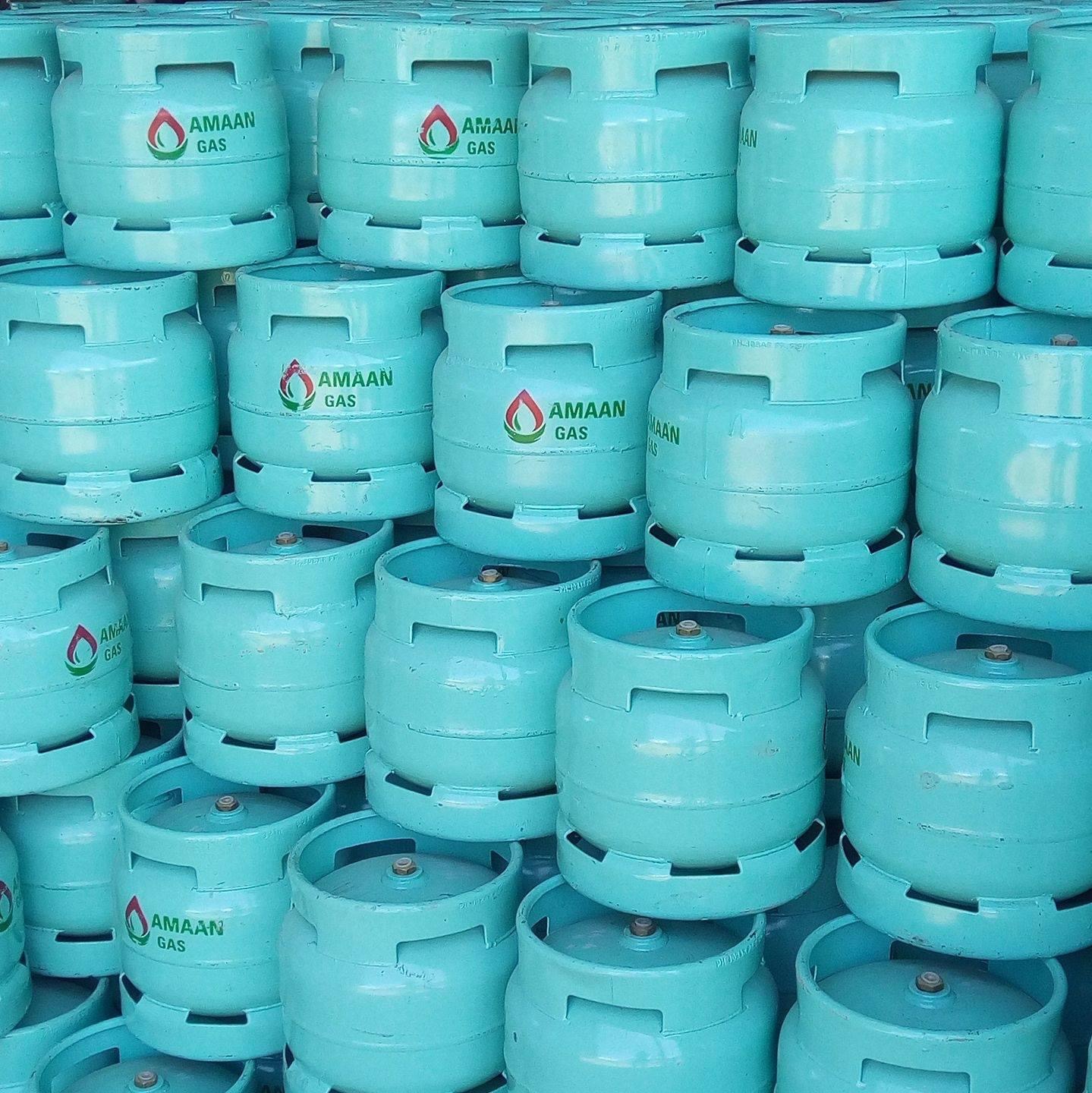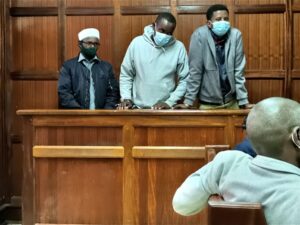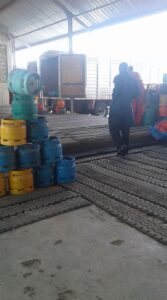Investigations
Rogue Firm On The Spot Over Involvement In Making Fake Cooking Gas

Amaan Gas Limited, the firm that owns Amaan Gas brand is the latest firm on the spotlight over unethical and illegal involvement in LPG cylinders a crime that has now become a menace to regulators as rogue firms in the lucrative gas industry engage in fake gas manufacturing.
In a case before Milimani Magistrate Court, MCCR/E436/2021 the firm’s director Mohammed Rashid Abdikalik who has been playing hide and seek with the court after junior staff of Amaan Gas Limited; Hassan Mohamed Mohamud, John Theuri Mathenge and Agostine Maina Njuguna and denied the fraud charges, are accused that on March 24 this year at the firmed premises L. P. G storage and filing station filing facility located along sabaki area Athi river within Machakos County jointly with others not before court they were found dealing with empty LPG cylinders of safe gas, Pro gas, Oilibya, Hashi gas, lake gas, gas yetu, Tisha gas among others without prior written consent from the licensed owners in the contravention of the law.
Theuri alone was charged that jointly with others not before court using a motor vehicle were found dealing with the above mentioned LPG cylinders without prior license from the owners.
The junior staff were released on a bond of Sh200, 000 or cash bail of Sh50, 000 each pending hearing and determination of the criminal case. Amaan directors were expected to appear in court on April 8 face criminal of charges of trading and dealing with LPG cylinders of another license. Kenya Insights search on the case couldn’t determine if this really took place. Milimani Resident Magistrate David Ndungi issued the summons after the directors failed to appear in court to plead to the charges.

directors co-accused persons Hassan Mohamed Mohamud, John Theuri Mathenge and Agostine Maina Njuguna appearing in court.
The new law – Petroleum Act 2019 – requires all LPG retailers, wholesalers and transporters to hold licenses for each business location following the abolishing of the compulsory LPG cylinder exchange pool.
It also says the licenses will be specific to the authorised cylinder brands, and retailers are required to obtain prior written consent from brand owners.
While consumers may have been saved from the kitchen raid plotted by the Treasury that would have seen the price of Liquefied Petroleum Gas (LPG) rise by at least 14 per cent from the Value Added Tax, another assault stalks them on the safety of the gas they use.
Invesigations has established that a number of bulk LPG refilling plants have emerged in residential areas, near schools, churches, and in some cases, government premises, creating waiting disasters as a cartel of dealers seeks to drive informality into the sector with little regard to user safety.
Amaan gas Ltd operates such a firm in Machakos where doing the raid following intelligence, unearthed their dirty dealings that have been ongoing behind the backdoor.
Letters written by dealers to authorities, including the police, list at least 34 sites spread across the country, half of them in Nairobi and its environs.
Illegal refillers have disrupted the LPG sector in what is now a blow not only to traders, but is also a safety concern to the consumer, who is unaware of the place the cylinder was refilled or when it was last checked for leaking or any other defects.
QUALITY CHECKS
“They don’t care about quality checks on the cylinders they are handling illegally, in the first place, and while the valves on the cylinders may be similar, the gadgets used to refill them may not be the same, meaning that, each time they are refilled in different places, the valve may get damaged and households are put at risk when they use such cylinders,” Omondi Omollo, a lawyer who has been prosecuting illegal refills said in an interview.
Kenya has one of the toughest laws in place to curb illegal trade in cooking gas—perhaps more punitive than some Acts on drug trafficking—but loopholes surrounding the setting up of the refill plants, bulk storage and ferrying of the same make nonsense of such regulations.
The laws contained in the Petroleum (Liquefied Petroleum Gas) Regulations, 2019 specify huge fines for offenders with a design to push self-check among dealers.
One is not supposed to sell LPG to another trader if they are not licensed and hiring a driver or vehicle to transport gas is as illegal as transporting it in an unlicensed vehicle. It means both parties are liable if found in illegal dealership.
The laws are just on paper; on the ground, LPG refilling plants in Nairobi’s Industrial area, Embakasi, Githurai, along the Eastern and Southern Bypasses, Kikuyu, Thika, Sagana, Kisii, Embu, Meru, Murang’a and other parts of the country are doing big business. The punitive law is the least of their concerns.
SAFETY
They either obtain cylinders from retailers in small shops and refill them at a lower fee to attract them or simply hijack lorries ferrying empty cylinders, refill them and sell in the local market. Brand owners who have pumped millions of shillings into cylinder manufacture, meanwhile, wait for eons for their cylinders, which they also need to check for safety before refiling.
Illegal refillers such as Amaan Gas will have evaded both the cost of manufacturing a cylinder and that of checking each of the valves for safety. Even better, they will escape any blame should the cylinder explode, or turn out to be containing bad quality gas. How they escape the law is, however, the loophole by enforcement agencies that has thrown consumers under the bus.
The Energy and Petroleum Regulatory Authority (EPRA) that is tasked with policing the market has been largely blamed for handling offenders with kid gloves. Dealers have been pointing an accusing finger at the regulator for issuing warning letters to offenders, but is reluctant to charge them in court, and in some cases even tries to drop the accusations midstream.
Epra is said by journalists to being snobbish in addressing fundamental issues raised by dealers. The questions around the illegal set-up of LPG plants in residential areas, poor enforcement of transport guidelines for LPG distributors, which endangers motorists unaware of the possibility that the next car could be full of the explosive gas cylinders on the road, and the authority’s questionable handling of cases in court, were all evaded by the authority despite confirming their receipt.
One of the latest incidents involved a dealer based in Mavoko. Officers from Anti-Counterfeit Authority and the Directorate of Criminal Investigations conducted a night raid in his Syokimau premises, confiscated close to 600 cylinders belonging to different brands and two vehicles to press charges against the businessman.
EPRA, which had described the trader found with cylinders belonging to 42 different brand owners as dangerous, shocked lawyers representing the offended brands when it applied to withdraw the case. In less than two months, the suspect had been given back his licence, which had been cancelled, with only a ‘warning letter’ as punishment.
WITHDRAW CHARGES
“We attended court on 23rd January 2020 when the accused persons in the case were scheduled to take plea. We were, however, taken by surprise to learn that EPRA, through the prosecution, intended to withdraw the charges against the accused person and substitute them with an enforcement action that includes a warning and a 60-day moratorium in furtherance of your letter dated December 20, 2019, which we came to know of its existence in court,” lawyers representing one of cylinder owners wrote to EPRA in protest.
The protest, which reached the Petroleum ministry, forced the regulator to rescind the decision, but this too has come back to haunt it as the suspect now wants to know how the ‘deal’ that ended with a warning letter has been overturned. The matter is still in court.
Late year in July, EPRA announced it had revoked the licence held by Swift Energy Distributors adding to the flip flop in addressing the illegal LPG business. It was the second time the licence is revoked in less than half a year while the regulator says the firm has on three other occasions been found in breach.
ESCAPE JUSTICE
The agencies are also said to be weakly joined in a multi-agency effort to root out the trade, another loophole that has seen various illegal dealers escape justice. Who raids, who charges and under what law has been a subject of blame game among enforcement agencies.
While the Anti-Counterfeit Authority can charge those who sell gas using brands they don’t own, the offence will only attract three times the value of goods seized. The Petroleum (Liquefied Petroleum Gas) Regulations, 2019 would fine them at least Sh10 million for it.
“The circumstances of this case disclose offences under the Petroleum (Liquefied Petroleum Gas) Regulations, 2019. Specifically, contraventions of regulations 13(1) and 14(a) as read with the Fifth Schedule. Further, the penalties described under this schedule, being a fine of Sh10 million are far steeper than those provided under the Anti-Counterfeit Act. I am, therefore, of the opinion that this matter falls under the mandate of EPRA,” ACA investigators wrote after the Syokimau raid.
It was also exposed last year by an insider within ACA that some 700 cylinders were being handed back to an offender in Embu after EPRA failed to take up the matter involving refilling of brands without authority from the brand owners — another offence attracting Sh10 million fine.
The enforcement loopholes and increasing demand for cooking gas have made the trade a multi-billion shilling affair with some high ranking government officials, politicians, officials within the regulatory agencies, and police said to have joined the business, threatening to reverse the gains made in pushing for the clean cooking energy source.
The huge penalties are also said to have inflated the size of bribes sought from offenders whose cartel-like nature of operations ensures one of their own is saved from conviction whenever they are arrested.
Its unsurprising that the case of Amaan has not only been slow but the directors acting with impunity and avoiding the courts perhaps working in the same script as the rest of gas cartels who get caught and cut deals with corrupt regulatory officials.
Increasingly helpless traders have been seeking help from various quarters. In May, the Energy Dealers Association wrote to Interior CS Fred Matiang’i decrying the rampant stealing of cylinders and named the firms they suspected to be breaching their brands, indicating their helplessness at the hands of the cartels in the LPG market.
“Despite the requirement by the regulations that prohibit cross filling and transportation of cylinders with the exception of companies that have entered into a mutual agreement to do so, some of our members have refused to comply and have continued to illegally cross fill competitors’ cylinders without the authority to do so.
CRACKDOWNS
“This has put the general public at risk because it can’t be traced who filled the cylinders and whether safety requirements were followed,” dealers’ association chairman Peter Macharia wrote in the letter that was copied to Mining and Petroleum CS John Munyes and EPRA DG Pavel Oimeke.
It must also be noted that disgraced ex-Epra DG Oimeke thrived in corruption and was forced to resign and tee being caught in a bribery scandal. That only goes to show what goes on behind scenes once these cartels are caught in the act.
Frustrated dealers have been seeking permission to set up their own enforcement to protect their businesses in what may spark acrimonious crackdowns among the players, some of whom belong to the same umbrella organisations like the ADA.
Cases like this of Amaan can easily disappear in thin air if deals are cut behind doors and no one does follow up to keep a watch on the progress. The cases will always be sorted out and the rogue firms back to operations without consideration of public safety. We’re determined to do a follow up on this case and see if it will suffer the same fate of induced death or if it will go all the way.
Rogue firms ought to suffer the wrath of law by getting heavily fined beside losing their trading licenses.
Consumers and the general public can only pray that a tragedy will not be the wakeup call for action.
Kenya Insights allows guest blogging, if you want to be published on Kenya’s most authoritative and accurate blog, have an expose, news TIPS, story angles, human interest stories, drop us an email on [email protected] or via Telegram
-

 Grapevine2 weeks ago
Grapevine2 weeks agoRussian Man’s Secret Sex Recordings Ignite Fury as Questions Mount Over Consent and Easy Pick-Ups in Nairobi
-

 News1 week ago
News1 week agoTHE FIRM IN THE DOCK: How Kaplan and Stratton Became the Most Scrutinised Law Firm in Kenya
-

 Investigations2 weeks ago
Investigations2 weeks agoMulti-Million Dollar Fraud: Three Kenyans Face US Extradition in Massive Cybercrime Conspiracy
-

 Economy1 week ago
Economy1 week agoIran Demands Arrest, Prosecution Of Kenya’s Cup of Joe Director Director Over Sh2.6 Billion Tea Fraud
-

 Business2 weeks ago
Business2 weeks agoA Farm in Kenya’s Rift Valley Ignites a National Reckoning With Israeli Investment
-

 Africa2 weeks ago
Africa2 weeks agoFBI Investigates Congresswoman Ilhan Omar’s Husband’s Sh3.8 Billion Businesses in Kenya, Somalia and Dubai
-

 Grapevine6 days ago
Grapevine6 days agoA UN Director Based in Nairobi Was Deep in an Intimate Friendship With Epstein — He Even Sent Her a Sex Toy
-

 News2 weeks ago
News2 weeks agoTragedy As City Hall Hands Corrupt Ghanaian Firm Multimillion Garbage Collection Tender


















